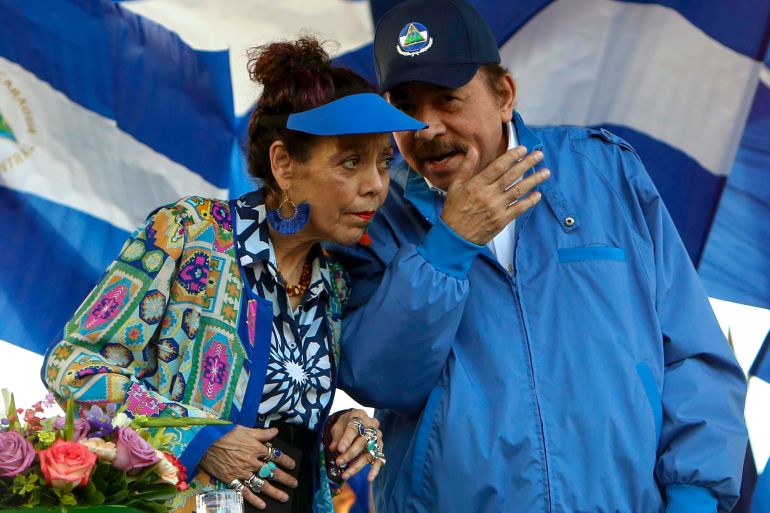Nicaragua: Daniel Ortega on course for controversial fourth term
Sunday’s elections followed a months-long crackdown on opposition and have been criticised by observers.

Nicaraguan President Daniel Ortega looked set to extend his rule into a fourth term following a controversial election on Sunday, after jailing top rivals and criminalising most dissent.
The polls, which have been widely condemned by rights groups and international observers, closed at 6pm (00:00 GMT).
Keep reading
list of 3 itemsNicaragua orders arrest of prominent writer Sergio Ramirez
Facebook says it shut down Nicaraguan government-run troll farm
The United States dismissed the vote as a sham, while Costa Rica, the country’s southern neighbour, also rejected the election even before preliminary results were announced.
While lines of voters formed in the capital, Managua, at some polling places in the morning, they later eased considerably, suggesting a historically low turnout.
Ortega, 75, whose Sandinista Front party and allies control the congress and government institutions, faces a field of little-known candidates in the presidential race on Sunday, while opposition figures who represented the most significant challenge to the former revolutionary leader’s rule remain in prison.
The election will determine who holds the presidency for the next five years, as well as 90 of the 92 seats in the country’s congress and Nicaragua’s representation in the Central American Parliament. He has ruled alongside his wife, Vice President Rosario Murillo, 70, the government’s official spokesperson, since early 2017.
Seated next to her on Sunday afternoon at an event broadcast by state television, an open-collared Ortega hailed the election as a victory over “terrorism” delivered by the “immense majority of Nicaraguans,” before launching into his critics.
“They didn’t want us to be able to hold these elections,” he said, referring to his domestic opponents and their foreign backers. “They are demons who don’t want peace for our people and instead opt for slander and disqualifications. Why? So that Nicaragua is embroiled in violence.”
The opposition called on Nicaraguans to stay at home in protest of what they said was a tainted electoral process.
As a young revolutionary, Ortega helped to overthrow the anti-communist strongman Anastasio Somoza in 1979. He first served as president from 1985 to 1990, before returning to power in 2007.
But critics say Ortega’s rule has come to resemble the government he resisted. That was particularly on display amid anti-government protests in 2018, which saw a violent crackdown by security forces and pro-government armed groups. More than 300 people were killed during the unrest, with Ortega decrying the demonstrators as “terrorists”.
In June, police arrested seven potential presidential challengers on what rights groups call trumped-up charges including undermining “national integrity”, working with foreign governments and money laundering. They remained in detention on election day. Some two dozen other opposition leaders were also detained ahead of the elections.
International response
US President Joe Biden tore into the Nicaraguan leader, saying in a statement issued before results were announced that Ortega and Murillo were “no different from the Somoza family” and had orchestrated a “pantomime election that was neither free nor fair, and most certainly not democratic.”
He called for the Ortega-Murillo government to take immediate steps to restore democracy and to immediately release the detained opposition figures.
“Until then, the United States, in close coordination with other members of the international community, will use all diplomatic and economic tools at our disposal to support the people of Nicaragua and hold accountable the Ortega-Murillo government and those that facilitate its abuses,” Biden said.
Last week, US officials said new sanctions were being considered against the couple’s government, a sentiment echoed by European Union leaders, in addition to a future review of Nicaragua’s status in the CAFTA regional trade pact.
The Organization of American States has also condemned Nicaragua’s holding of political prisoners and unwillingness to hold free and fair elections, but Ortega’s government has only railed against foreign interference.
The regional body will hold its annual general assembly in Guatemala later this week. Guatemala, Honduras and Mexico were among seven countries that abstained from a vote on a resolution last month condemning the repression in Nicaragua.
About 4.5 million Nicaraguans were eligible to vote, and the Supreme Electoral Council has said the first partial results would be released at about midnight.
In a Sunday post on social media, the Ortega-allied electoral authority celebrated more than 200 “election companions” from 27 countries plus 600 journalists of all nationalities covering the vote, without providing details.
International observers from the EU and the Organization of American States were not allowed to participate.